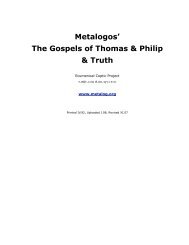Andrew Louth - Syriac Christian Church
Andrew Louth - Syriac Christian Church
Andrew Louth - Syriac Christian Church
You also want an ePaper? Increase the reach of your titles
YUMPU automatically turns print PDFs into web optimized ePapers that Google loves.
4<br />
THE DOCTRINE OF THE PERSON OF<br />
CHRIST<br />
Maximus owes his title ‘Confessor’ to his defence of the Orthodox<br />
doctrine of the Person of Christ, against the theological view,<br />
emanating from theological circles in Constantinople, and endorsed by<br />
imperial authority, that suggested language of one activity, or one<br />
will, in Christ, as a compromise with the Monophysites. It is,<br />
however, a striking fact that it is with apparent reluctance that<br />
Maximus becomes involved in this controversy. Although he follows<br />
Sophronius’ lead in rejecting the Alexandrian Pact of Union of 633, to<br />
begin with he abides by the Psephos of Patriarch Sergius, defending it<br />
as implicitly condemning the Alexandrian Pact—which seems<br />
somewhat disingenuous. It is only from 640 that he explicitly attacks<br />
Monothelitism, and even then he seems anxious to defend Pope<br />
Honorius, the originator of the Monothelite formula, from any personal<br />
charge of heresy. 1 It would seem, however, that this hesitation was due<br />
to a reluctance to engage in public controversy (he was, after all, only<br />
a simple monk, not even an abbot), rather than from any lack of<br />
clarity about what Christological orthodoxy demanded, as it can be<br />
shown that from well before 640 his exposition of Christological<br />
doctrine demands duality of energy and of will in the Incarnate Person<br />
of Christ. For it is not only in the later Christological opuscula that<br />
Maximus discusses the doctrine of Christ. Christology is so central to<br />
his theological reflection that it is rarely far from his thought: of the<br />
works translated in the present volume (most of which must be dated<br />
earlier than 635, and the most substantial complete by 630) only one<br />
(Amb. 1, the first of the later Difficulties) is free from allusion to<br />
Christology, being a very brief comment on the doctrine of the Trinity.<br />
MAXIMUS’ ‘CHALCEDONIAN LOGIC’<br />
But before we look at these, it will be useful to say a word about the<br />
theological terminology Maximus uses in his exposition of the mystery<br />
of Christ (and indeed the mystery of the Trinity). We have already




